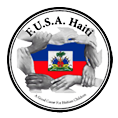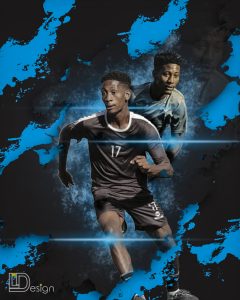Interview:
Zavarov Andreville
In June 2015 FUSA’s trial was organized in Port-au-Prince (Haiti) in collabration with Fondation Athlètic d’Haïti. During a period of 5 days, FUSA selected 4 players and one coach to come to Belgium. Here, they could gain knowledge and insight about the European football system. Furthermore, they were introduced to a first division team (STVV), where they trained and learned for one month.
Did your internship in Belgium change your perception on football? How?
Before my trip to Belgium I had a different perception on the football world. I realised that I never had a clear view on what this world was all about. Comming to Belgium opened my eyes and made me realise that I had to put in a lot of work and effort if I ever wanted to become a professional football player. Not only in the way I played the game, but in eveything aspect concerning football. In Haiti the focus is more on the physical gameplay instead of the technical aspect. Also the tactical part is often neglected in my home country.
Looking back on this experience, would you change anything within the Haitian football?
Absolutely, there are several things I would like to change to benefit the image of Haitian football. Such as the trainings, the management and, last but not least, the youth developement. Like I already mentioned in the previous question; during trainings the focus should lay more on the tactical and technical aspect. In my eyes, this can only be achieved through decent education for our trainers. In a likewise manner, football management should also focus on their education. Haiti is desperately in need of management trainings. In this way Haitians will have the knowhow in taking care of their own players. Last but not least, the biggest change I would make, is the one within the youth education. I have seen so many grown up players with potential that had to adapt their way of playing football just to be able to get a contract. I am one of those players, and I can not help but think that I would have had it a lot easier if I grew up within a well structured football environment.
On forehand, what did you expect of your trip to Belgium? Where there certain habits or cultural differences that surprised you?
Before I arrived in Belgium I had no knowledge whatsoever of the culture of Belgium. I didn’t know the typical foods they ate, the languages they spoke or even the weather conditions.
Once I arrived in Hasselt (a small city in Belgium) I realised the many differences with my home country. The most striking difference, I can think of, is still the carnival. It blew my mind that people celebrate this event by throwing candies. The vibe between Haitian and Belgium carnival is also incomparable. In Haiti the event is colorful, loud and celebrated by the entire nation. It’s a national pride, and everyone participates in it. The entire country is full of music, dance and laughter. In Belgium it is more quiet; people see it as another event and then to go to work the other day.
How was it like to live in a professional football club? Are there a lot of differences with Haiti?
Belgium football clubs and Haitian onces are miles apart. In Belgium everything is structured and well organized. Your performance, health and physical condition is constantly monitored and checked upon. They also have the right equipement for everything and have decent sport infrastructure. Literally everything is taken care off, from trainings schedules to security. They make sure you can fully focus on your game while they take care of all the administration. In Haiti, the opposite is the case. If you want to play football, you only have yourself to rely on. You are the one that has to arrange everything and there will be noone to do it for you.
Describe your experience with FUSA? How did the cooperation go? What were the arrangements?
To start with I am going to tell you that I never left my birthcountry in my life. Therefore it’s obvious that I was a bit nervous to trust this organisation to begin with. The moment I arrived in Belgium and saw the conditions I was going to live under, all my worries went away. The CEO (Paul Moïse) from FUSA was always ready if I needed something and everything was well arranged on forehand. We never needed to worry about transport, food or even entertainment. Therefore, for me, FUSA is a great organisation. They are well organised and transparent. Moreover they try to make Haiti a better place by reducing crime and encouraging young people to put time and effort in sport and education.

